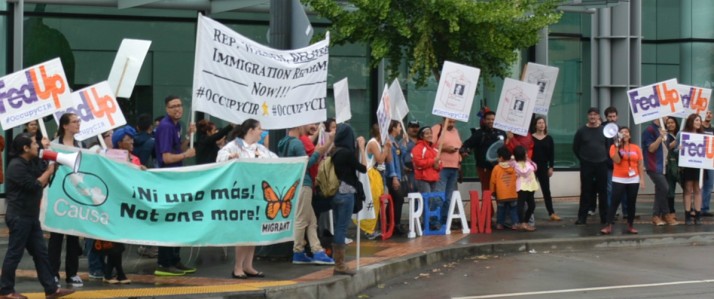After Governor Kulongoski and the Oregon legislature restricted driver licenses to only those who could provide proof of legal residence in 2007, MRG grantees and allies worked for a better system, developing the leadership of those most impacted and building a powerful cross-sector coalition. In 2013, these groups secured a major victory when the Safe Roads Act passed the Oregon legislature with statewide, bipartisan support and was signed into law by Governor Kitzhaber at Causa Oregon’s May Day rally on the state capitol steps.
Then, in early 2014, a small group of people determined to turn back the clock on immigrant rights put Measure 88 on the ballot, requiring a majority “yes” vote to affirm the action that the legislature had already taken. Even with the “Yes on 88” campaign pulling in support from editorial boards, business, labor, faith, elected, and community leaders (including MRG Foundation), Measure 88 went down by a large margin on Election Day – a tough loss for Oregon’s immigrant rights movement.
Later in November came the President’s long-awaited changes in immigration enforcement, extending deferred action to the undocumented parents of U.S. citizens and green card holders. This isn’t a roadmap to citizenship, but it will provide work authorization and real and much-needed relief from the threat of deportation for over 64,000 Oregonians.
Andrea Miller is a former MRG grantmaker and board member and the current executive director of Causa, Oregon’s statewide Latino immigrant rights organization. In light of November’s losses and partial victories, we asked Andrea to share her insights into what’s happened and what’s next for Oregon’s immigrant rights movement.
MRG: Measure 88 seemed like a reasonable response to keep drivers complying with the law. But the vote wasn’t even close. How did this happen?

Causa Oregon Executive Director, and former MRG Board Member, Andrea Miller
Andrea: We knew at the start of the campaign, and so did our allies, that the ballot title of this measure was misleading and was going to be confusing to voters. There was a lot riding on the single sentence that every voter is guaranteed to read before voting.
We polled a different ballot title, where the language was more specific about allowing all Oregon residents to be able to drive and get insurance. On our poll, with a different title, the measure had 52 percent support.
The Safe Roads Coalition tried to get a more accurate title via the legislature, which passed drivers’ cards in 2013 in the first place. And we almost succeeded! Had we gotten one more vote, a different title would’ve appeared on the ballot. With a title more aligned with the Safe Roads Act, the outcome could have been different.
But this was also the first time that Oregon had a public conversation about drivers’ licenses as they related to immigrants.
When we were door knocking and talking to voters, we had to start from the beginning. A lot of people didn’t know that undocumented people couldn’t drive legally, that the ability to get insurance and drive had recently been taken away. They didn’t know about the Safe Roads Act of 2013. Then once we explained it, people would say, “Yes, I understand,” and “Yes, I will vote.”
But we didn’t have the resources to knock on all the doors in Oregon. We were a very under-resourced campaign, given how much education we had to do on this issue.
I want to emphasize that I don’t interpret these results as Oregonians rejecting immigrant communities, or not wanting people to be able to drive. This was a matter of a misleading title, deceptive and alarmist ads by the opposition, and insufficient resources to educate enough Oregon voters.
I have hope for Oregon voters that they will come to support this issue. Oregon is not Arizona. Not at all.
MRG: What role did race and racism play in the outcome for Measure 88?
Andrea: Our opposition, Oregonians for Immigration Reform and several Republican candidates, used fear and xenophobia to tell people to vote no.
Challenger Patti Milne used Measure 88 to attack Peter Courtney (D-Salem). The ads were in mailboxes, on television, and on the radio, asking “Do you want criminal terrorist illegal aliens to be able to board a plane using only a utility bill to get a driver’s card?”
It was completely false — you couldn’t get a driver’s card by “just showing a utility bill” — and this was a new low for Oregon politics.
Oregonians for Immigration Reform had little money or campaign savvy, but a lot of this strategy and money goes back to Loren Parks. He’s the one who contributed money to put this on the ballot. And he was funding the five Republican legislative campaigns that were attacking incumbents based on this issue.
It didn’t work for the candidate races — none of the candidates running anti-immigrant attack ads against incumbents won. There were so many people complaining about those ads. They were really ineffective, xenophobic, and hurtful.
MRG: There was another big development later in November. What can you tell us about that?
Andrea: Two weeks after the election results came the executive action expanding deferred action for 64,000 Oregonians — this extends work authorization, relief from deportation, and possibly a driver’s license to parents of citizens or green card holders. It’s called Deferred Action for Parental Accountability (DAPA).
MRG: So access to driving and car insurance for people is still going to expand?
Andrea: It looks like it will, but we’re waiting to hear confirmation from the Oregon DMV.
Deferred Action for Childhood Arrivals (DACA), which halted deportation proceedings and provided work authorization for some undocumented young people who had grown up in the U.S, went into effect in 2012 and Oregon officials had to ask “Are we going to issue drivers’ licenses to DACA recipients?” Those officials decided, yes we would. So there’s already a policy in place to allow deferred action recipients under DACA the ability to get tested and insured to drive in Oregon.
We’re waiting to see if the Oregon DMV takes a similar approach to this new policy for the parents. They haven’t announced yet what they’re going to do.
As far as licenses for all Oregonians, we’re going to move forward and approach the legislature with a bill to address the rest of the Oregonians who are still not able to drive or get car insurance. The Obama action for DAPA is temporary and limited, so we still need a result for the broader drivers’ license issue. But we don’t know when this legislative solution might happen.
MRG: What are your thoughts as we head into 2015?
Andrea: Obama’s announcement, while limited and temporary, came about because of years of organizing by so many coalitions and organizations. It took a whole slate of organizing tactics – from leadership development and sit-ins to direct lobbying and people coming out and telling their stories – to lead to this one victory.
Many people, including me, find it somewhat lacking, but only Congress can provide a long-term and comprehensive solution. So we have to continue to push them to act. I know people find that discouraging – a lot of people in Oregon laid it all out for Measure 88, and now we’re going to have to work harder than ever for a longer-term win.
But last month’s move by the president—it gives us momentum, it gives us hope, and it shows that organizing works.





